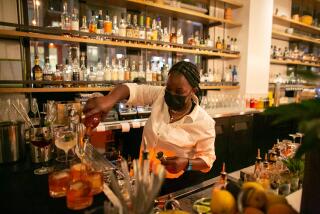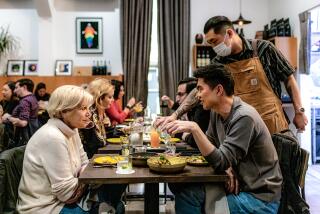What happens when a restaurant worker gets COVID-19?
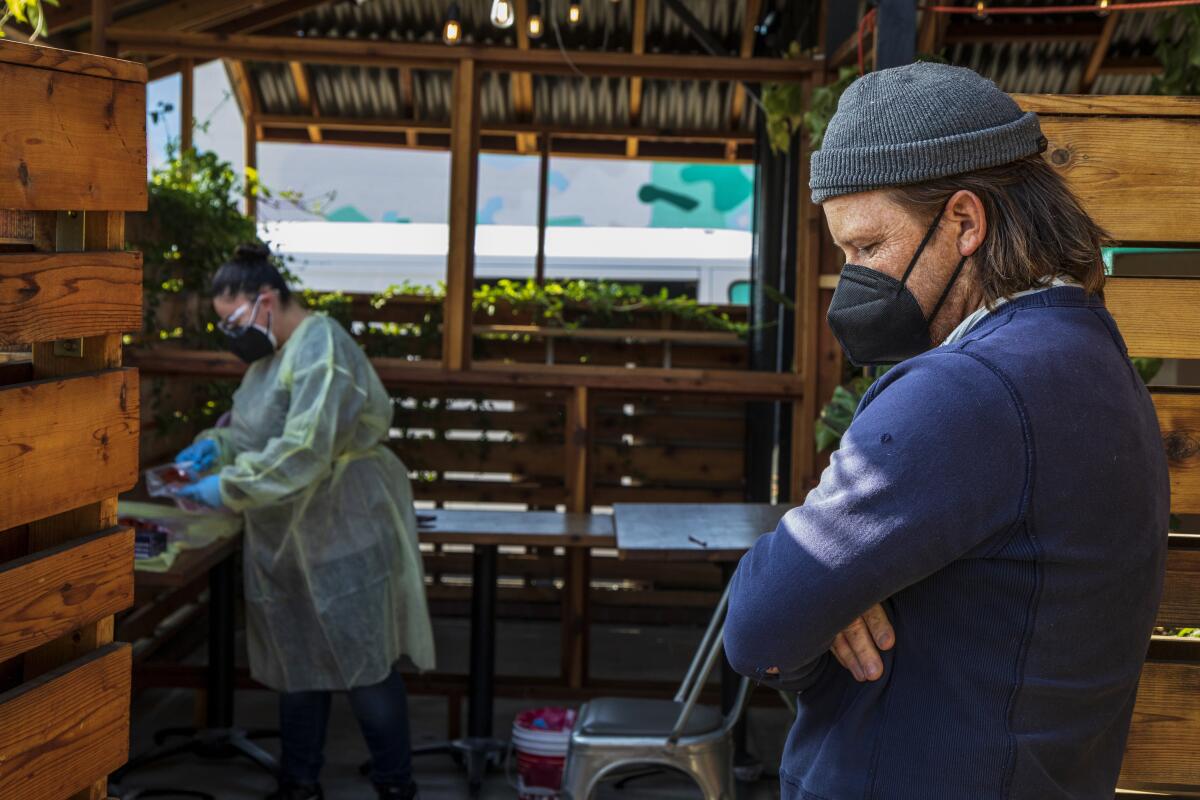
- Share via
On Nov. 1, Ashley and Tyler Wells were deep in rural Northern California, driving south, about 10 hours outside of Los Angeles. They were returning from a camping trip in the wilderness. Although the cell service was spotty, a call from one of the chefs at All Time, the Los Feliz restaurant the couple opened in 2018, came through.
The chef called to say an employee, who had been out for a couple of days, had tested positive for the novel coronavirus. Soon after they hung up, the couple called the restaurant. They had to make hard decisions, and they had to make them quickly.
“You can’t just say, let’s finish out the day,” Tyler said.
In the middle of a busy Sunday, with dozens of orders in the works, the couple made the decision to shut down All Time. Out of the 10 people working in the two adjacent spaces the restaurant operates near the corner of Hillhurst Avenue and Price Street, the Wellses asked a line cook and two sous chefs to stay and help close. They also posted an employee at the front door to tell customers that All Time was closing. And the Wellses refunded thousands of dollars in online orders (any food that was already prepared for outstanding takeout orders was thrown away).
“This is the heartbreaking part — it was shaping up to be the busiest day we’ve had since this whole thing started, but we had to tell the guys to stop cooking,” Ashley said.
They started researching CDC and L.A. County Department of Public Health guidelines on how to quarantine and isolate. They attempted to create a timeline of who was in contact with whom and when.
“We’re not doctors and scientists, but we’re doing the best we can and trying to be as cautious as possible,” Ashley said.
The Wellses scrambled to distribute information on where and how to get free testing, researching the closest facilities for employees. Then they waited. They waited days for people to get appointments at county testing sites and then waited for the results. Ashley said the average turnaround time for an employee to get tested and get results was five days. Then they asked their employees to get tested a second time. The restaurant was closed for 14 days, and Ashley said they had to lay off two salaried employees because they could no longer “support the salary load.”
The lack of readily available, fast testing is something many restaurant owners are struggling with during the pandemic. They are frustrated about what they say is a lack of coordination among various government agencies and contradictory mandates that can be difficult to follow. Many of them say they need test results faster than the county can provide, and some are arranging for private testing. Some are shutting down for weeks at a time.
In the meantime, as of Jan. 12, the L.A. County Department of Public Health was reporting that about one in every five people getting tested for the coronavirus is positive.
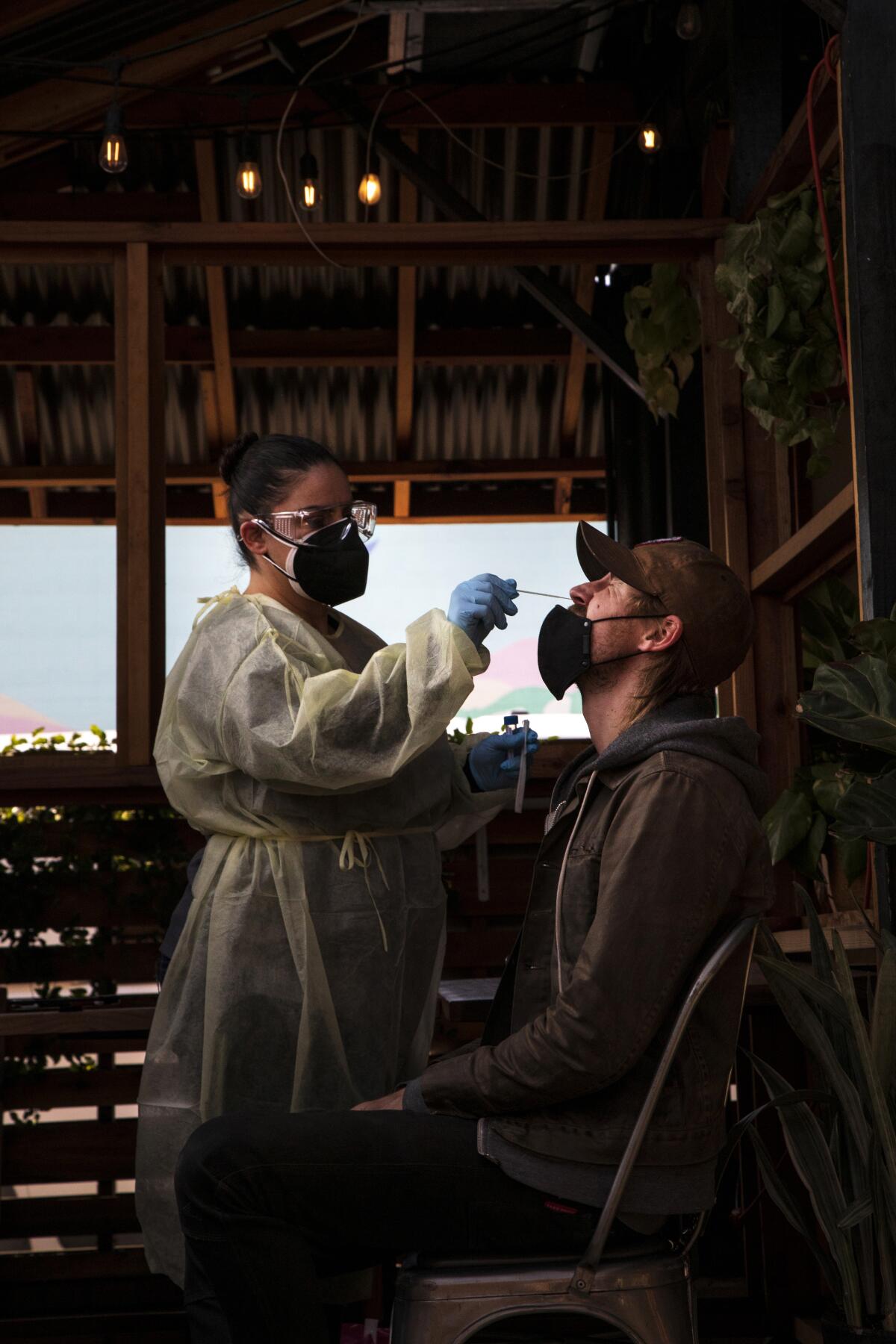
The Wellses decided to call a nurse from a private service to arrange for testing in the parking lot of their restaurant, offering regular tests to anyone on staff who wanted one. The service costs them $150 per test, plus additional fees.
“We need to have actual information” to know how to move on, Ashley said. “The cost of [testing] is nothing compared to the cost of being closed for one day. Every day that we can shave off how many days we have to be closed is a tradeoff.”
On Jan. 1, another All Time employee tested positive for the coronavirus. The results came back in the middle of a busy service, and the couple decided to close the restaurant, again. They refunded orders in progress and shut the doors, and they called the same private service and scheduled tests for employees the next day. They paid for a second round of testing on Jan. 5.
When it comes to safety and other mandates affecting restaurants in Los Angeles (selling retail products, building out dining rooms on sidewalks or on streets), businesses need to consider multiple government agencies, including the CDC, the county and state public health departments, CAL/OSHA, the state ABC and various city councils and city planning and zoning departments — depending on their location. They also need to consult attorneys, workers’ comp insurance and unemployment insurance mandates.
According to the California Department of Public Health’s guidelines for responding to COVID-19 in the workplace, if one employee tests positive, employers are required to provide testing for all other employees. If employers need help facilitating testing, they are instructed to reach out to their local health department.
Ashley said the L.A. County Department of Public Health visited the restaurant for a routine inspection just a week before the incident in November but provided no information on testing.
“No one has reached out to communicate any updates to resources, policy or protocols from the Health Department, OSHA, city or county,” she said. “We did not consult the health department website for how to handle [it] this time around [in January] because it was so insufficient and vague in November.”
Some restaurateurs say the state guidelines are hard to understand. When asked what restaurants should do if employees don’t have access to immediate testing and can’t afford private testing, a spokesperson for the California Department of Public Health wrote in an email: “If individuals suspect that they may have COVID-19 or were exposed to COVID-19, they should contact their local health department (LHD) for testing and contact tracing support. LHDs are most knowledgeable about testing resources in their jurisdiction. CDPH has been working diligently with LHDs in expanding testing capacity.”
The email also directed me to the state testing task force’s existing site-locator tool, which has links for where to find a testing site and information on the task force. When asked if the LADPH will help an employer facilitate testing, a spokesperson for the department wrote in an email: “Businesses can check the website at: https://covid19.lacounty.gov/testing/ or have staff call 211.”
When a staff member tested positive at his restaurant in December, Clark Street Bread owner Zack Hall said, he didn’t know where to turn.
“Finally, after eight months of staying COVID-free in the bakery, it hit us,” he said, adding that he felt “defeated.”
Hall made the decision to close his Echo Park facility. He immediately called a doctor and arranged to pay to have all 40 of his employees tested the next morning.
“People were scared, nervous, worried, and we wanted to gather all the information and get our footing to make sure we had the knowledge to make the best decisions moving forward,” he said. “We spoke with [county] health. They didn’t help us arrange testing. We sort of jumped on it.”
Hall hired a service to deep-clean the bakery, put together his own COVID-19 protocols for employees and started to provide testing through a private service every couple of weeks. He closed the business for four days and spent $25,000 on closing, preparing to reopen and testing.
After learning about a possible exposure at All Day Baby in Silver Lake, owner Lien Ta started emailing employees with information on how and where to get free testing. She offered transportation to employees without cars. Ta closed the restaurant for two weeks but said the lack of guidelines on when and if to close was confusing.
“There are no guidelines,” Ta said. “For example, something that I think about often is: If Trader Joe’s gets a positive employee, will they or have they closed down?”
(LACDPH has a public list of businesses that report cases online. On Jan. 11, for example, a grocery store in Westchester was listed as having 10 confirmed cases. A call that day confirmed the store was open.)
A spokesperson for LACDPH also emailed restaurant-specific protocols that label three positive coronavirus cases at a business in a 14-day period as an outbreak. Businesses are required to report outbreaks to the department. The spokesperson said all outbreaks are investigated and the department may close a business based on its findings.
Green Street Restaurant co-owner Bob Harrison said clear guidelines and consistent answers from state and local health departments would have been helpful after he learned that one of the 35 employees at his Pasadena restaurant had tested positive for the coronavirus.
In researching what to do, Harrison said he found that CAL/OSHA requires employers to contact their local health department if there is an outbreak , while the Pasadena Department of Public Health guidelines requires employers to report each case.
“It can be a bit overwhelming and confusing as more agencies issue regulations,” he said.
According to Eddie Navarrette, vice president of the Independent Hospitality Coalition, a group that advocates for hospitality businesses during the pandemic, there is a lack of transparency and communication on a state, county and city level, contributing to feelings of distrust and frustration among the restaurant community.
Navarrette, who has worked with close to 100 food service facilities in Los Angeles as a consultant with his company FE Design & Consulting, is also the advocacy committee chair for the IHC, which has more than 400 members in Southern California.
“The No. 1 thing we’re asking for is a seat at the table,” Navarrette said.
He pointed out that the L.A. County Economic Resiliency Task Force, created to help restaurants and other businesses during the pandemic, fizzled after indoor dining was allowed to resume briefly in May, a move that was announced to restaurants the evening they were allowed to reopen. And the reopening guidelines? They were posted that evening as well.
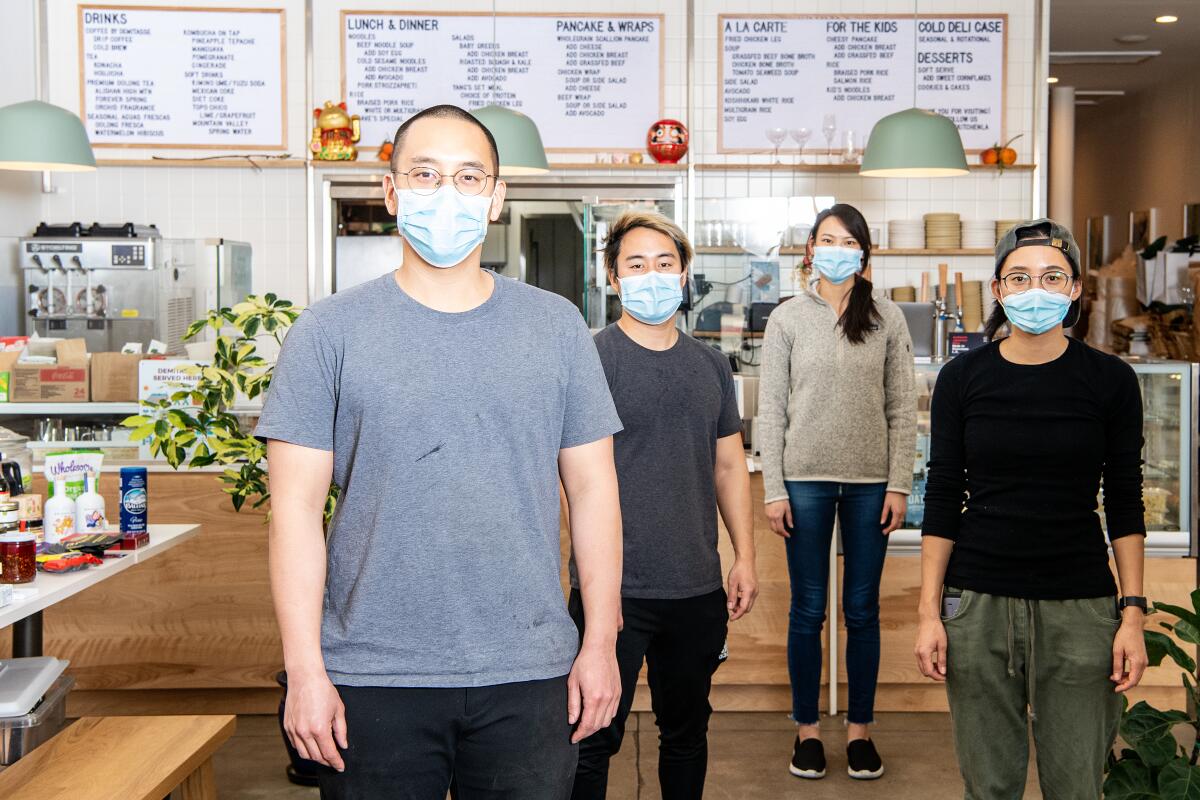
“You can put a set of rules out there, but you need to have someone to call,” Navarrette said. “It shouldn’t be like going to AT&T to try to get consistent information on guidelines that affect people’s health and livelihoods.”
Yang’s Kitchen chef-owner Christian Yang said that’s why he turned to other restaurant owners after one of his employees tested positive for the coronavirus last summer. The test came up during a recommended routine once-a-month testing of employees through the county. With only five employees, Yang said he’s been able to get county tests for the staff in a timely manner, except during the holidays.
“If there was more aid or assistance we wouldn’t have to decide between health and business,” he said.
Yang found safety guidelines online, put together by larger restaurant groups around town such as David Chang’s Momofuku Group and the Rustic Canyon Family Group, which includes restaurants from Bryant Ng and Jeremy Fox.
Rustic Canyon Family Chief Operating Officer Joel Dixon said the group started looking into restaurant protocols overseas in March, in addition to combing through guidance from the CDC, to create its own set of guidelines.
Dixon said the group just revised the nearly 40-page document (available in English and Spanish) last week to incorporate the county’s new directive on a mandatory quarantine period after travel.
“It never ends,” he said. “There is a huge amount of information to organize and sift through each time local, regional, state and federal officials drop rules, and it can be really frustrating when they don’t align.”
Recognizing that most restaurants don’t have the infrastructure to develop something similar, the Rustic Canyon Family Group made the guide public.
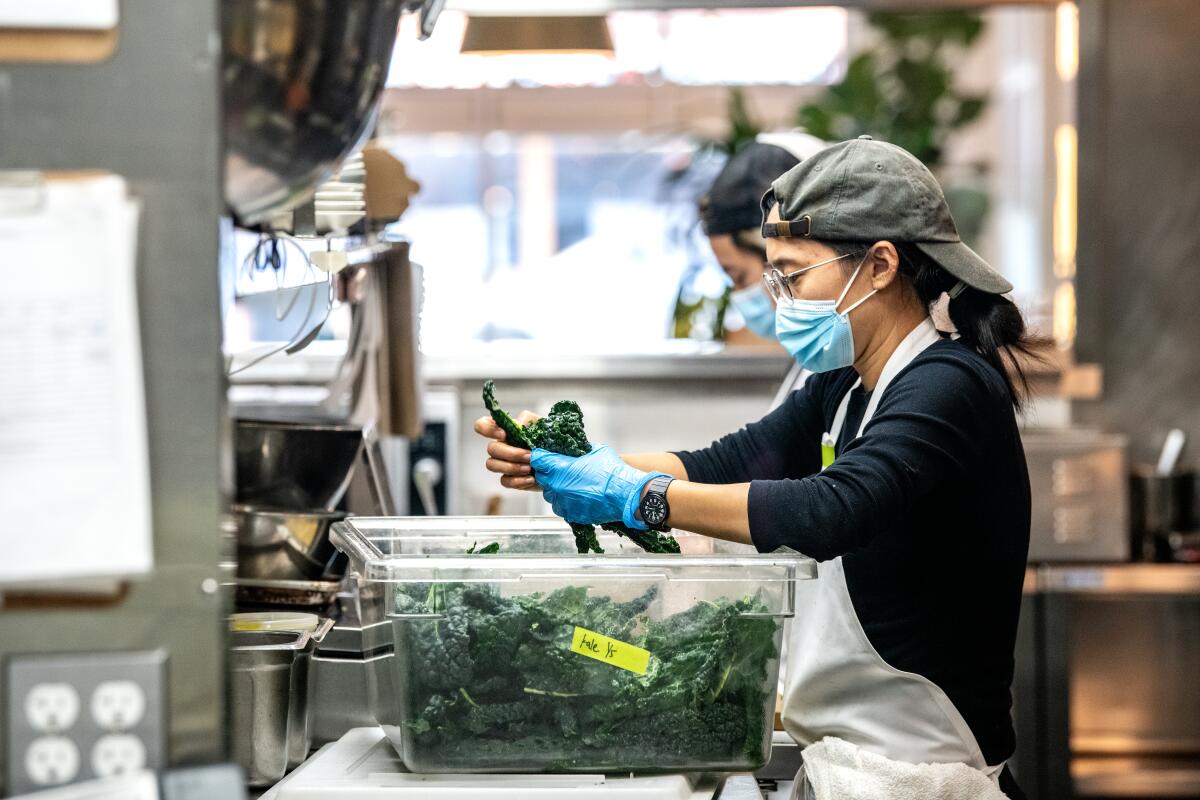
“It was really important for us to be a light and a resource for others,” Dixon says. “We don’t have the luxury to wait around for help.”
Yang said he used the Momofuku and Rustic Canyon guidelines to create his own. After reopening his restaurant last summer, he orchestrated a COVID-19 orientation for employees and distributed his own safety guidebook. He also uses a daily checklist from the Rustic Canyon Family Group, which includes questions about social distancing, symptoms and the date of your last test result.
Harrison said he’s been able to use the information provided by the Pasadena Department of Public Health to help him navigate reopening but that testing is still his biggest challenge, with his employees having to wait hours to receive a county test and days to get the results.
“It would seem that since we have been living through this for nine months that testing should be more readily available,” he said.
Some businesses such as Alta Adams, Daniel Patterson and Keith Corbin’s restaurant in West Adams, have decided to preemptively put additional safety precautions in place, without any positive cases at the restaurant. Alta Adams now has a six-person pod that is committed to not socializing with anyone outside of work and home. The restaurant asked staff to take what they need from the restaurant to avoid visiting any stores. And it has asked staff members to be tested every five days. The plan is to see how things go for a few weeks. If the staff feels safe, it will remain open. If not, it plans to close. Patterson outlined the precautions in a post on Instagram.
“We feel that any business that serves the public in a time of crisis like this has an obligation to let customers know what we are doing to keep ourselves and them safe,” Patterson wrote in an email. “As a somewhat public voice, I wanted ... to be clear about what we are doing, in case it might be helpful to others, and as a statement of our values, because it seems like a lot of people aren’t taking this as seriously as they could.”
Whether the restaurants are getting private or free county tests, they are continuing to lose money.
“Spending thousands a week on testing is untenable for us but untenable not to,” Ashley said. “And there’s no subsidy for this.”
All Time is open, and the Wellses have already “enacted some moderate price increases on the menu,” to help cover the price of tests, payroll taxes and new requirements for workers’ comp insurance brought on by the pandemic.
“The theme is that no one is coming to save you,” Ashley said.
More to Read
Eat your way across L.A.
Get our weekly Tasting Notes newsletter for reviews, news and more.
You may occasionally receive promotional content from the Los Angeles Times.
